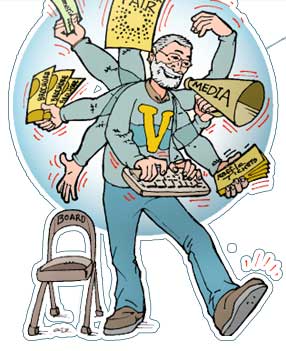








Occupiers Pre-Occupied with Economic Inequality
Brandon Sun “Small
World” Column, Monday, October 31 / 11
Zack Gross
Zack Gross
What began as “Occupy Wall Street” (OWS) has become a movement, spreading to cities across North America and around the world.
And, it was a Canadian idea! The very popular magazine Adbusters, based in British Columbia, initiated the protests to shine a light on social and economic inequality, corporate power and greed, and the financial sector’s influence over our governments. One thousand cities and towns worldwide have held or hosted Occupy protests.
Citing the growing disparity in our world between rich and poor, and the lack of repercussions to those who fed into our current global financial crisis, the magazine suggested in its July edition that people take action and Occupy Wall Street on September 17th. And it has grown from there.
This movement appears to be leaderless, and it is attracting a wide variety of people who are concerned about the environment, community economic development, governance and more. Although many are young activists, there are also politicians, union officials, academics, church activists and ordinary families participating.
"We are the 99%" is their cry! This is in reference to the growing share of the US economy controlled by the elite one percent.
World leaders, celebrities, business people and others have weighed in on the debate, either with criticism or praise for the protesters. One corporate CEO pointed out that the top earners also pay into the economy large amounts of taxes that aid people at all economic levels in society.
Our own Prime Minister has said that Canadians have much less to protest due to the financial regulations and social programs our country offers.
Behind the protests and the debate is the fact that we live in a “globalized” world.
The nation state which has been the foundation of relationships and regulations for centuries seems to be on its way out, while our daily lives and incomes are governed more by the “macro-economics” of the corporate and financial sectors.
The International Monetary Fund (IMF), the World Bank and the G8 (and maybe NATO) are our government now, whether they are setting a course for African development, waging war on terrorism or undemocratic regimes, or orchestrating social program cuts in Europe in the so-called Eurozone Meltdown of 2011.
Those who run a globalized world where decisions are made at the centre (Washington; New York; Davos, Switzerland) believe (or say they do) that fully integrating our economies into their system will bring about progress and prosperity for all, including the poorest in developing countries.
Those who don’t support “globalization” say that what the protesters are rightly focusing on is a new colonialism where the face of poverty creation has been changed (but it is still the wolf at the door!).
The proponents of globalization say that the good news for the poor is that trade and foreign investment with the Third World has grown exponentially in recent years. Opponents of globalization say that while economic activity has grown, it is no different than in colonial days.
The wealth being created by increased export agriculture and mining in poor countries in not being shared with them, it is being extracted from them.
The poverty that is deepening amongst the poor in these difficult economic times is based in part on the speculative activities of the financial sector that has driven up the price of food for the most vulnerable, forcing people in India, Africa and the Middle East to eat two meals per day instead of three, to drop meat from their diets, and ultimately to join social movements like the Arab Spring to protest oppression in their own countries.
Fifteen percent of the world population, based in North America, Europe and Japan, still controls 75% of world economic output.
Nowhere is this more evident than in Sub-Saharan Africa where the number of extremely poor people has doubled in the last generation and where financial outflow from unfair trade deals and backlogged debt payments stands at three times the amount coming into the region in financial aid.
Economic activity is based on export agriculture and mining, which includes the buying up of African farmland by corporations and wealthy countries and the use of chemicals that harm people and the environment.
Inequalities lead to communal violence (tribal, social) while conflict between rival armies is also fueled by the uneven wealth available to those who can control and exploit resources, from diamonds to cocoa.
The new landscape that surrounds us, economically and politically, is that global financial forces direct social and national priorities. At different times in world history, when world leaders awoke for their daily activities, they consulted their priests or generals and were told “what to do.”
Today, a new force is in power, and the Occupy movement is acting out its concern that we should all be aware of what is happening and how it is affecting us.
Hopefully, we’ll notice!
Zack Gross works for the Manitoba Council for International Co-operation (MCIC), a coalition of more than 40 international development organizations.
* * * * *
Return to Articles page
Return to Articles page